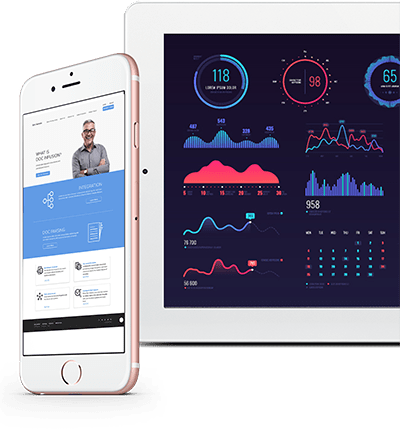
Integration Services
The programs and systems we use to keep our businesses running don’t always speak the same dialect. Having separate applications that don’t integrate well or at all cause many problems, one of which is manual data entry—a time-consuming, costly, and error-prone solution.
There’s an easier way.
DocInfusion can help you unlock and integrate your programs, allowing your ERP system to seamlessly communicate with any system including e-commerce platforms, CRMs, EDI and more. Integration means you can streamline the process of sharing data system to system. With our ERP integrated solutions, you can spend less time on tedious manual entry and automate your business processes.
What Is ERP Software Integration?
A great ERP integration definition is simply that Enterprise Resource Planning (ERP) platforms are software suites that facilitate and improve the efficiency of business management. Similar in concept (though different in purpose) to CRM, BI, and project management platforms, they’re usually provided by third-party SaaS companies to enable businesses to work faster and be more organized.
But what is system integration in ERP? While many businesses have different systems up and running that manage their business processes, they may not have integration between their existing platforms. System integration in ERP allows bi-directional data integration between existing platforms, handles back-end integration for a better customer experience, and prevents siloed systems that can’t work together.
You may already know all of what’s written above — what you may not know — is that despite being designed to speed up your business, your ERP may actually be slowing you down.
To understand, “what is system integration in ERP?” you need to know that ERPs, like other SaaS platforms, are self-contained software suites, and without the proper APIs, they can’t share data between other applications. This can isolate data, requiring manual data entry to transfer between platforms. Manual entry comes with its own problems, including being time-intensive and prone to error. This decreases data accuracy and slows down business processes.
ERP integration services alleviate this problem by building the proper APIs between the ERP and other platforms used by the organization, so that information stays organized, is easy to transfer between platforms, and can be viewed from a single dashboard. With a full understanding of an ERP integration definition, you’re ready to learn exactly why you should integrate your ERP systems.
Why Should I Integrate My ERP?
As mentioned above, software platforms like ERPs are self-segregating. Without proper APIs and an ERP integration strategy to bridge one application to another, your ERP can’t share information with any of your other software suites, hence the need for system integration in ERP. This means that if your company uses an internal system to help run the business, your ERP and that system can’t communicate — and that’s not all.
These days, businesses both large and small use a variety of third-party SaaS solutions, and like internal systems, none of them can communicate with an ERP unless there’s an API to bridge the gap. This is the digital equivalent of having every office in your organization housed in a separate building. It slows down work processes and makes everything more complicated.
For example, sales leads are slowed down when sales reps need to go back and forth between your platforms in order to get a full picture of the customer they are working with. This slows down sales time leading to lower productivity for your team and reduced sales for your company overall. It’s a waste of time and resources and is an inefficient way to run your company (especially as you grow and expand).
The need for system integration in ERP is real. Without ERP integration services, your team will continue to have to switch between platforms each time you need to switch tasks, as well as transfer all data manually, potentially adding errors to the data each time you do. A great ERP integration strategy will help you manage your customer data, financial data, accounting, shipping, billing, customer purchase history and more.
Which Platforms Can I Integrate?
The good news is you can integrate virtually anything with your ERP, making work that much easier for you and your team. Here at DocInfusion, we can help you link your ERP to software such as CRMs, business intelligence, project management and HR software, and e-commerce platforms.
Our team of experts has experience working with a wide variety of ERPs, including:
Acumatica
Intacct
Microsoft Dynamics
Sage
Shiptech E2
Access Dimensions
Brightpearl
And More
Introducing DocInfusion’s Premier White Glove Integration Service
Unlike other integration providers, which typically offer an out-of-the-box or DIY solution, DocInfusion is a white glove service. That means we handle the work of integration of ERP with business platforms from beginning to end. You tell us what platforms you need to be connected, and we get to work making it happen. Then, we supply you with the solution, so you can use the software you need the way you need to use it.
So whether you work in manufacturing, retail, or B2B, we can give you the most comprehensive and user-friendly solution available. No more manual entry, error-riddled data, or duplication errors. Just data exchange at the click of a button. It’s that easy.
Ready to talk?
Get in Touch with the Team at DocInfusion to Get Your Integration Process Started Today.
